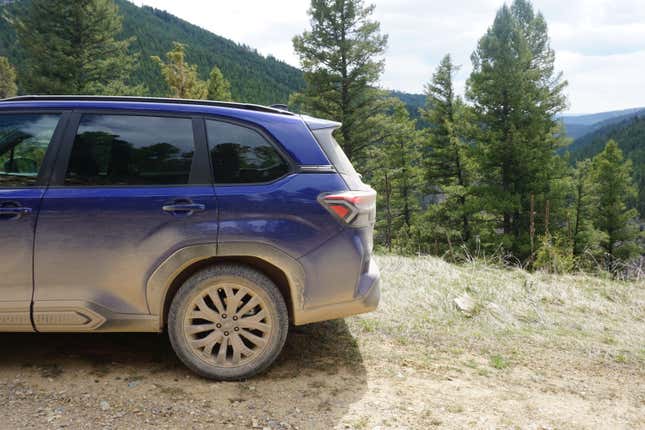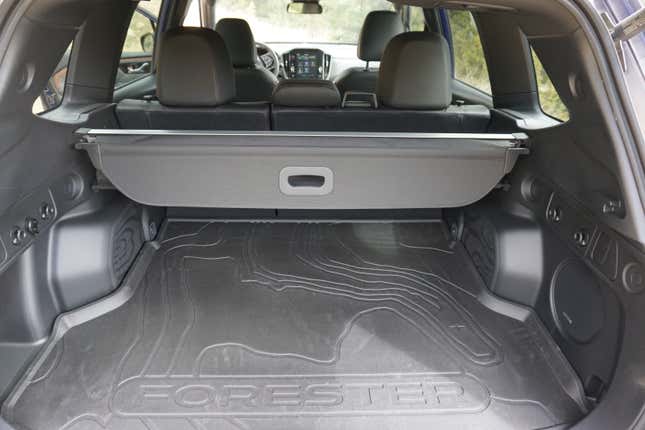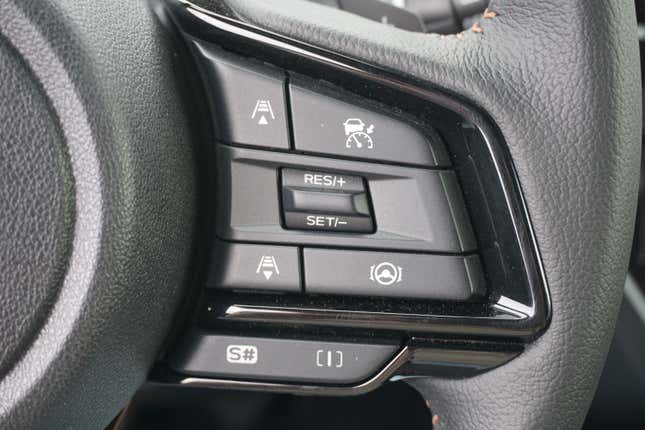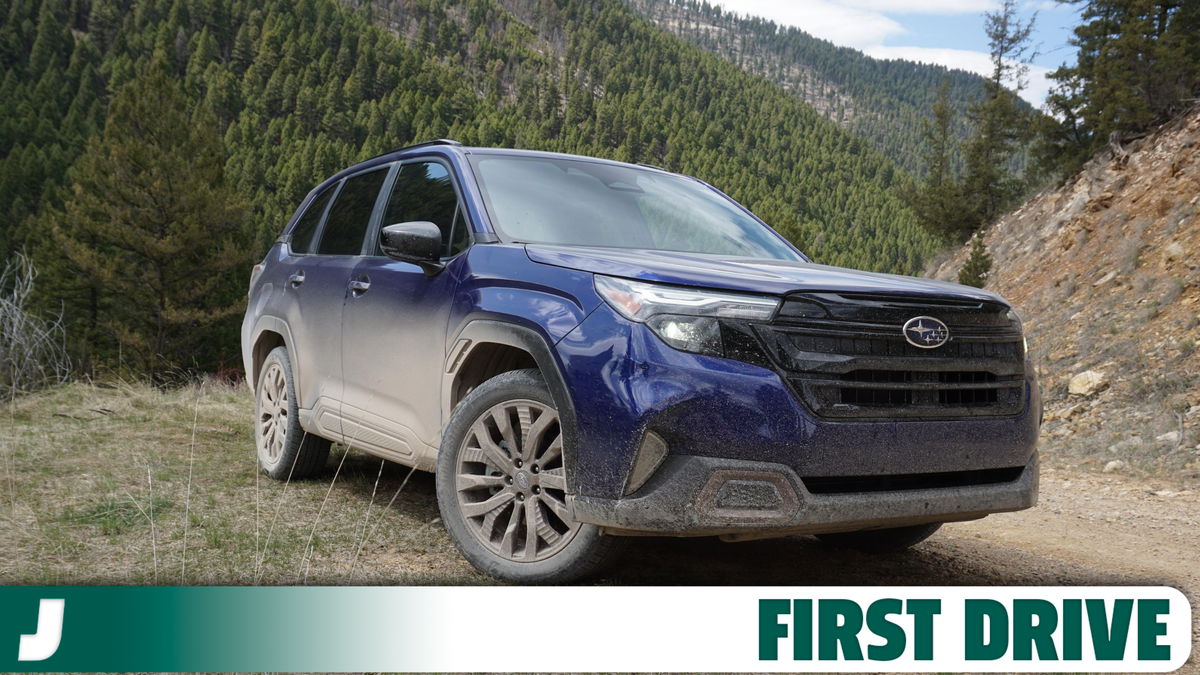There aren’t many mainstream automakers with a DNA as powerful as Subaru. The second you step into one or see one on the road, you automatically know what it is. For the most part, the new Forester — Subaru’s middle child between the compact Crosstrek and the ever-growing Outback — still has that. It may have grown up a bit for its new sixth generation, with more sound deadening and tech than ever before, but (for better or worse) it is still very much a Subaru product.
The Japanese automaker didn’t really reinvent the wheel with the new Forester. However, it added enough little touches to make the Forester a more formidable opponent to compact crossover mainstays like the Honda CR-V, Toyota RAV4 and Hyundai Tucson all while keeping most of its Subaru-ness intact.
Full Disclosure: Subaru flew me out to western Montana and put me up in a cabin that cost more per night than my monthly rent, all so I could drive the 2025 Forester.
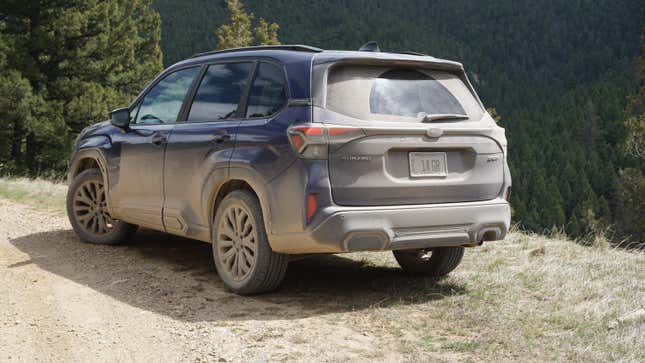
On the outside of the 2025 Subaru Forester, you’re really not going to notice that big of a difference between it and the fifth-generation crossover it replaces. Sure, some design elements have been stretched and augmented to give the impression the Forester is bigger and beefier than it really is, but not much else has changed. Despite the fact that it’s more evolution than revolution from the outside, what’s underneath and inside the car are totally new, but still totally Subaru.
The two big themes of the new Forester are usefulness and refinement. Subarus of days gone by have been known for their — let’s just say — lack of refinement between noisy interiors, hard plastics and gruff engines. The new car looks to change all that. Subaru talked at length about how much more effort they put into sound deadening, soft-touch materials, a new production process (with more structural adhesive) and drivetrain calibration to make the new Forester feel, well, nicer. I’ve gotta say, it paid off.
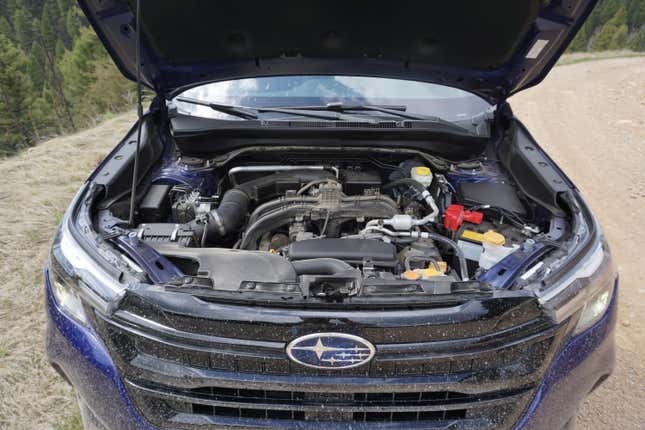
This is just about the quietest Subaru I’ve ever driven. I mean, it’s not perfect. You still hear plenty of noise from the now-fairly-ancient Subaru FB 2.5-liter flat-4 mated to a redesigned continuously variable automatic transmission. It’s just nowhere near as unpleasant as driving a Subaru crossover hard once was. Speaking of the drivetrain, let’s just say it’s a great example of why so many people like electric vehicles. There’s nothing inherently wrong with the naturally aspirated four-popper, but Subaru only managed to squeeze 180 horsepower and 178 pound-feet of torque from the 14-year-old motor. The engine actually makes less power than it does in the Crosstrek, and I don’t think that’s very fun.
Subaru is also obsessed with CVTs, so that’s what you’ll find here. For 99 percent of drivers, it is more than good enough. You really won’t notice it until you try doing some more sporty driving or use the transmission’s eight simulated manual gears. That sucks.
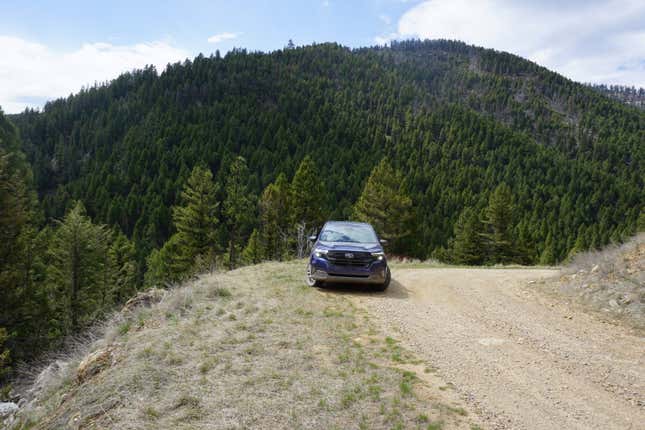
Still, Subaru’s symmetrical all-wheel-drive system is fantastic, if not class-leading. With X-Mode (your off-road drive modes) engaged, this thing is nearly impossible to get stuck, which is perfect if you fancy yourself a weekend warrior of sorts. Its 8.7 inches of ground clearance helps in the effort as well. This is a Subaru at the end of the day — it’s going to be fabulous even on a semi-treacherous trail (something I spent a lot of time driving on in the wilderness of western Montana), but it’s also much improved on the road.
No one who buys a Forester is even remotely interested in high-speed testing or 0-to-60 runs, but we did them anyway! In my very unscientific testing, the Forester Sport I was driving was able to hit 60 mph in about 10 seconds. That’s not fast by any metric, but it isn’t that slow either. Some of the oomph is helped by the fact the torque curve is much lower now. Before, peak torque used to be near the redline, but now all 178 lb-ft of fury is available at 3,700 rpm. That’s still pretty high compared to the Forester’s turbocharged counterparts, though.
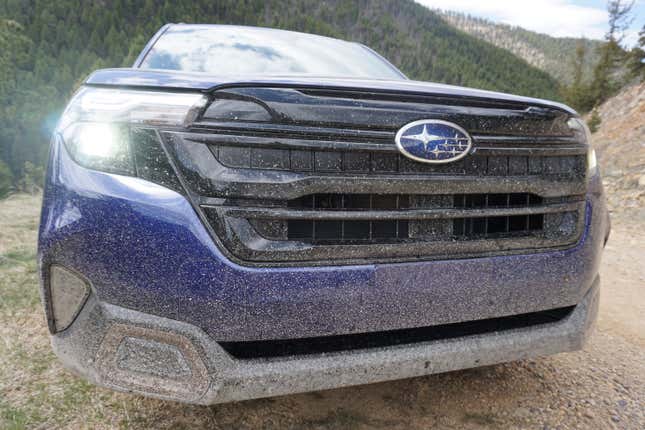
Going around corners is very “whatever man, who the hell cares?” The Forester can do it. You won’t roll over in a fast turn. You’ll be fine. It doesn’t matter. It has the dual-pinion power steering rack from the Subaru WRX, if you care. You probably don’t. It’s a Forester for Christ’s sake. If you are autocrossing a stock Forester, then please seek help.
Do you know what Forester buyers care about? Fuel economy, probably. In that regard, the Forester is solid. Subaru says, depending on wheel size and trim, you should be able to average between 28 and 29 mpg combined. Not too shabby. Thanks to its 19-ish gallon fuel tank, you’ve got an effective range of nearly 550 miles. That’s very solid and will be more than enough for whatever outdoor adventures you find yourself on, like Ultimate Kayaking or Hang Glider Mountain Biking. I don’t know outdoor activities.
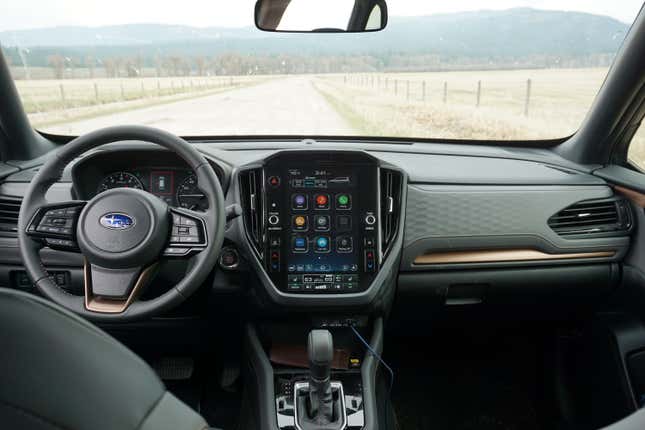
That’s enough of the Forester’s mechanical bits. Let’s talk about the other big update here: the interior. It’s totally redesigned for the Forester’s sixth generation, and it is a hell of a lot nicer than any Forester I’ve been in before, provided you don’t mind a very large screen. Everything in here is very typical Subaru in terms of looks, but it’s all just a bit nicer than it was before. For the majority of my day, I drove a mid-level Sport model. With the option pack ticked it had an MSRP of $37,590, including destination.
Subaru put a lot of thought into making the interior of the Forester a nicer place to be, adding in better materials and upgraded tech. On the subject of said tech, it’s sort of a mixed bag. Subaru threw its 11.6-inch vertical touchscreen into the center of the Forester’s cabin in almost every trim level, and many of the car’s core functions now live within it. You still get a volume and tuning knob as well as temperature controls, but everything lives on the screen for better or worse. It means the whole cabin is rather uncluttered, but there’s a lot of hunting you gotta do to find anything. Add in the fact that this is not the most responsive touchscreen in the world, and it’s a bit of a letdown.
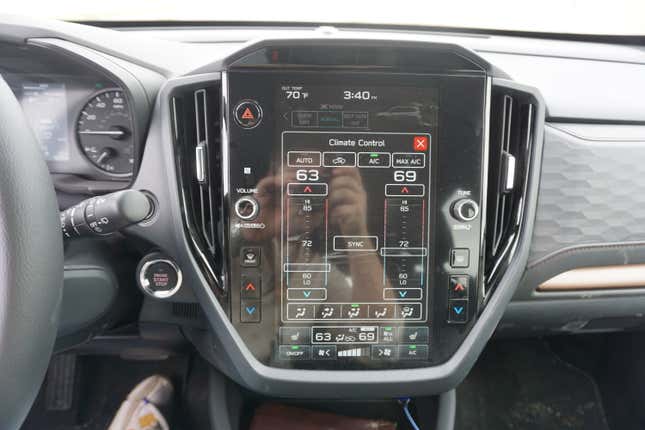
On the plus side, there’s now an upgraded version of Subaru’s EyeSight camera system that adds a third camera in the middle of the other two for better safety-ness. Both its adaptive cruise control and lane-keeping assist, while not world-beaters are very solid. Subaru is all about safety these days, and these systems make me think the company really means it.
So, while the infotainment and driver safety suite are rather tech-forward, the gauge cluster is not. Screens for gauge clusters are super in vogue right now, but that’s not what you’ll find here. Instead, you’ve got a classic analog tachometer and speedometer flanking a small LCD screen in the middle that has all of your driver information. While a highly customizable gauge cluster is a nice thing to have, it’s sort of refreshing to see two big ol’ gauges staring back at me as I drive down the road.
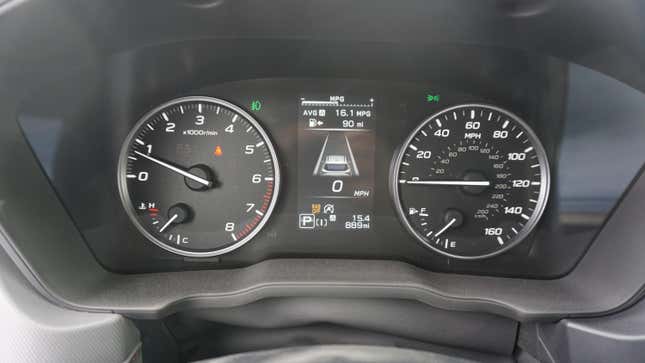
Everything else about the interior is very solid. It’s not a luxury car by any means, but as far as mass-market cars go, it’s a pleasant place to be with enough thoughtful design elements to keep the demons in your head away for the time being. That’s especially true for the bronze accents in this Sport tester. A little splash of color never hurt anybody, and it’s nice to see it here. Further adding to the solidness are the front seats. They’re both wonderfully comfortable and hold you in rather well when the going gets bumpy.
Subaru was also very conscious of how people use their Foresters, mainly the fact they like to shove them full of outdoorsy shit and head for the woods. Because of that, Subaru made the rear door openings larger to accommodate more oddly shaped stuff, and while the new car is barely bigger than the old one, Subaru carved out a whole bunch of extra interior space for people and the things they bring with them.
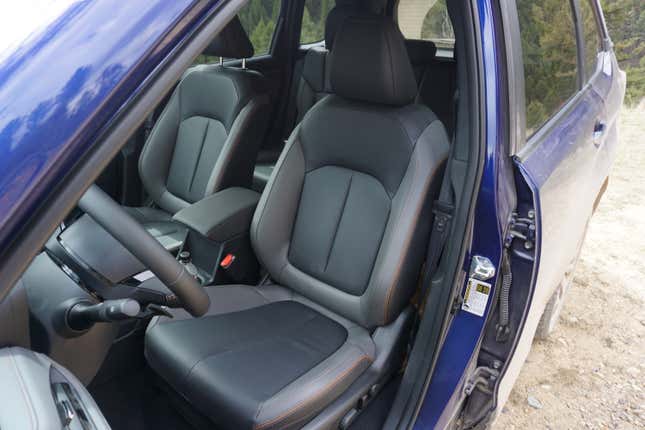
At launch, there are five different Foresters you can choose from: Base ($31,090), Premium ($33,390), Sport ($35,890), Limited ($37,995) and Touring ($41,390). All prices include $1,395 for destination. Don’t worry, an off-roady Wilderness model will be coming soon enough. Anyway, the Base car gets you stuff like EyeSight driver assist, dual-zone climate control, two 7-inch touchscreens, 17-inch wheels and LED headlights. The Premium adds that 11.6-inch touchscreen, a 10-way power heated driver’s seat, a panoramic sunroof, wireless phone connectivity, push-button start and X-Mode. You can also add an option package that’ll give you a power liftgate and blind-spot monitoring.
From there, we’ve got the Forester Sport, the car I spent most of my day driving. Subaru bills it as the most youthful of the bunch, and it gets you 19-inch wheels, different suspension tuning, StarTex upholstery with bronze accents inside and out, standard blind-spot detection, paddle shifters and an upgraded “Dual-Function” X-Mode. You can also option a Harman Kardon audio system and a power rear liftgate. Neat.
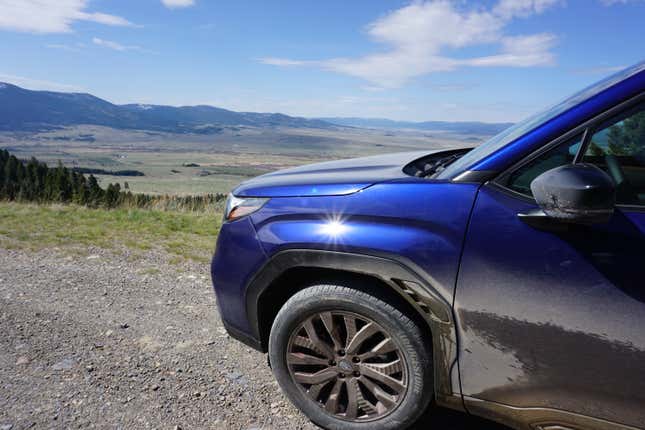
Now, we move on to the two big boys of the range: the Limited and Touring. In the Limited you get 18-inch wheels, leather upholstery, a standard power liftgate, a power passenger seat and a heated steering wheel. For some extra cash, you can add in the Harman Kardon stereo and navigation. Finally, we’ve got the big spender Touring. It adds 19-inch wheels, leather and Ultrasuede upholstery, that Harman Kardon audio system, heated and ventilated seats, a 360 camera and a rearview mirror camera. That’s a lot of stuff for a $41,390 top-end price.
So, Subaru isn’t exactly disrupting the automotive industry when it comes to the new Forester. Anyone who gets the entire vibe and ethos of the brand will be right at home in the automaker’s middle-child offering. In a brand that is dominated by both the Outback and Crosstrek, it’s nice to see the humble Forester getting some more attention.
It may not be a world-beater when it comes to on-road performance, but that has never really been the point of these cars. For the most part, compact crossovers are meant to be a vanilla blob that carries you from one place to the other. The very fact Subaru bothered at all to inject any sort of personality into the new Forester is a job well done to me. You can buy a CR-V or RAV4, and they will serve you fine. But they will not be nearly as charming as the 2025 Forester, and God help you if you get stuck on a rocky trail.
